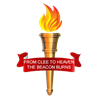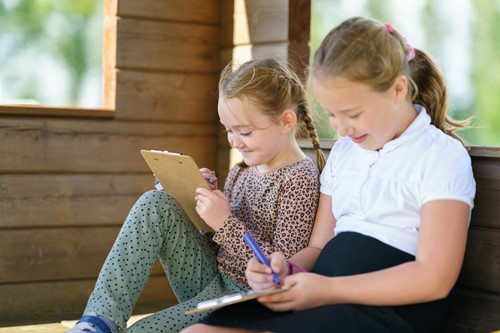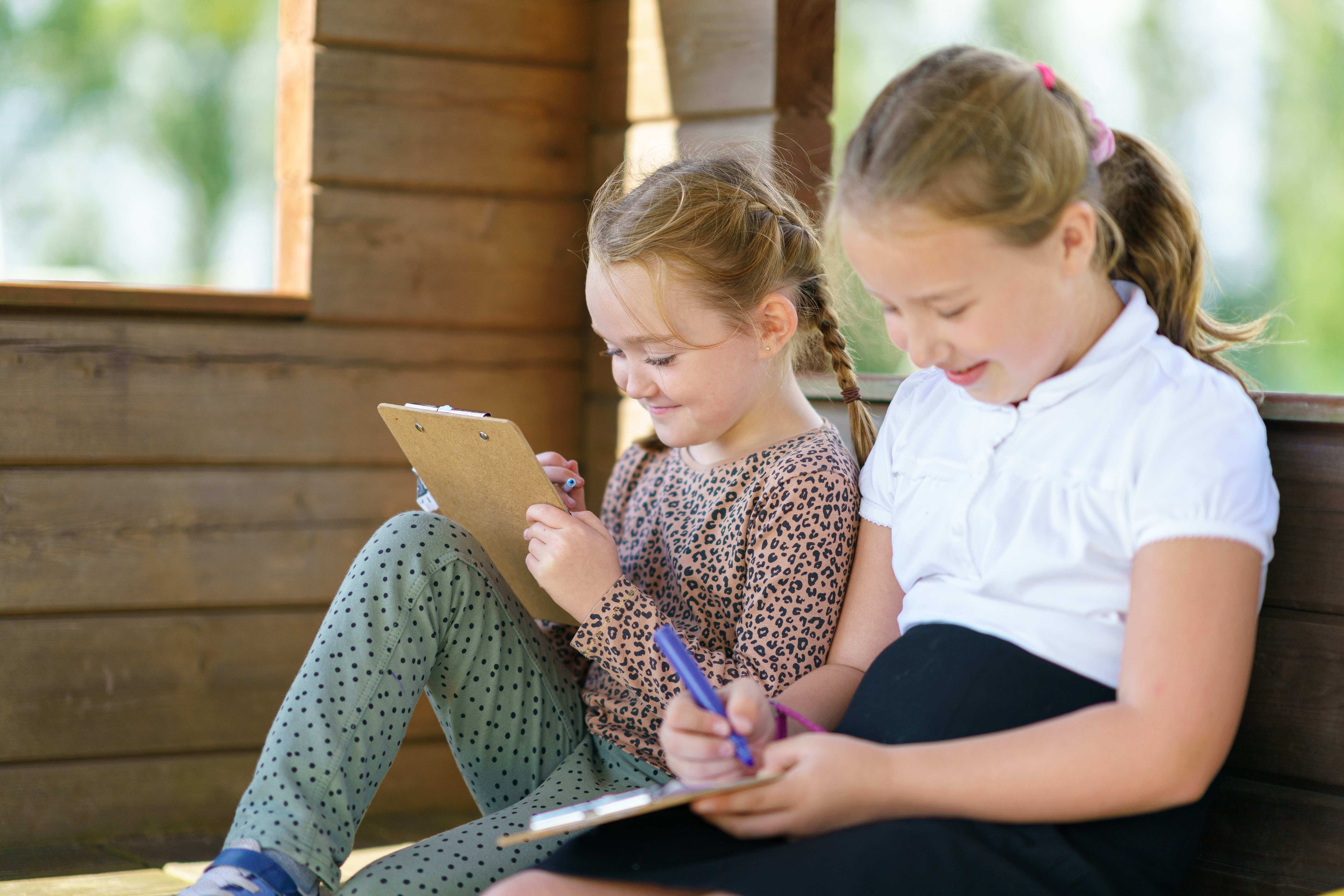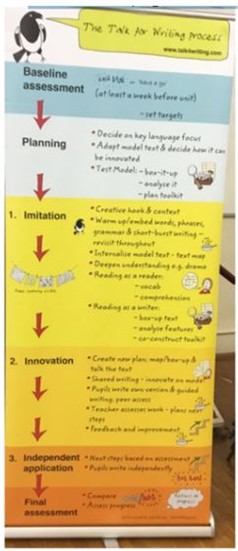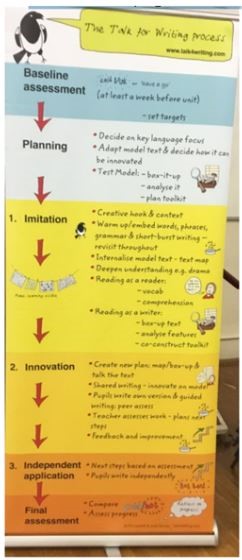Writing Curriculum Statement
Intent
At Clee Hill Community Academy, we want all children to be able to confidently communicate their knowledge, ideas and emotions through their writing and reach their full potential.
Our aims are to:
• Ensure progression of writing skills across the school.
• Provide meaningful writing experiences using the contexts inspired by quality texts/ use cross-curriculum links
• Inspire pupils to write through exciting shared experiences.
• Model high standard writing to secure high expectations and inspire writers.
• Ensure children are taught a range of social functions that writing can perform e.g. persuade, instruct, inform, and entertain.
• Enable children to demonstrate the ability to choose the appropriate form and content to suit the purpose and audience.
• Recognise that drafting, incorporating significant revision into their writing and proof-reading are integral parts of the writing process
• Use creative curriculum themes to provide meaningful writing experiences through contexts.
• Have a clear progression of teaching writing includes familiarisation of text type through reading, exploring features, planning, drafting, assessing and editing
• Achieve independent writing of a high quality
Implementation
The school follows the Talk for Writing Process. Talk for Writing enables children to imitate the key language they need before they try reading and analysing it. Through fun activities that help them rehearse the tune of the language they need, followed by shared writing to show them how to craft their writing, children are helped to write in the same style. As a result, they rapidly develop their reading, writing and language skills.
At Clee Hill Community Academy, we use Pie Corbett’s suggested actions for key connectives to encourage continuity throughout the school. We take photos of the children doing these actions and display on the working wall so the same actions are used consistently for each class. The grammar progression document links with the Pie Corbett T4W programme.
The talk for Writing guidance is not a ‘fixed’ structure of writing to follow rigidly but a suggestive process of writing over a 2-3 week unit of work.
Cold task: A cold task should be completed prior to planning a unit, as the purpose is to highlight areas of development/ next steps to improve their writing. The genre of the cold task should be the same but the context can be completely different.
WAGOLL (What a good one looks like). The children need LOTS of exposure to what a good text looks like to know what you are expecting from them. These WAGOLLs should be displayed as part of the working wall so that the children can refer to them as much as possible. Teachers often write these to ensure that they include the features that the children need to practice. http://www.literacywagoll.com
to what a good text looks like to know what you are expecting from them. These WAGOLLs should be displayed as part of the working wall so that the children can refer to them as much as possible. Teachers often write these to ensure that they include the features that the children need to practice. http://www.literacywagoll.com
Modelled Writing: The teacher talks aloud the thought processes as a writer. They have complete control over the writing and make explicit the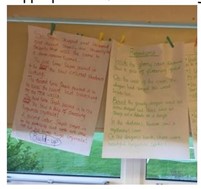 structure, language features, spelling and punctuation of the text type as appropriate. Modelled writing is displayed on washing lines for the children to refer to.
structure, language features, spelling and punctuation of the text type as appropriate. Modelled writing is displayed on washing lines for the children to refer to.
Shared Writing: This is a collaborative approach; pupils contribute their ideas and thoughts for the teacher to select the most appropriate. The teacher needs to give reasons for the choices made.
Supported Composition: The children work in pairs to provide the next sentence of the text. This may follow from either modelled or the shared writing process. This may be part of a TPS activity (Think, pair and share).
Guided Writing: Pupils are grouped by writing ability according to their levels and/or target needs. The teacher works with each group in rotation during the week so that every child partakes in guided writing once per week. The task is carefully selected to provide an appropriate level of challenge and will focus on a particular aspect of the writing process as opposed to writing a complete piece. Tasks may include the processes of planning, drafting and editing pieces of writing. Teachers choose a target for each group to work on based on an assessment of their individual needs and previous writing. TAs are also expected to take guided writing groups when appropriate.
Hot write: All children are given opportunities to apply their understanding of the text type in their own writing. This is vitally important if children are to develop their skills as writers within different genres. This is the opportunity for children to ‘show off’ all the skills that they have learned in the writing process.
Edit and redrafting process: This needs to be taught to children so that the editing actually improves their work. Use of a visualiser or photo of work and discussions about how to make it better as a class are effective. Include really clear success criteria for how you want the edited work to improve. Sometimes, this might be one paragraph to improve or focus on story endings etc. It is important in KS2 that time is spent editing a piece of writing. This can be done at any stage of the writing process but after a hot write and time with the children, it is a good time to edit and redraft. Give the children a chance to improve on their work after their discussion with you. Use your green edit and improve pens. In KS2 this is expected to be at least a paragraph – sometimes whole text.
Handwriting - Kinetic Letters: Kinetic Letters® is the handwriting programme which we use at Clee HIll.
Using four main threads of:
- Making bodies stronger,
- Learning the letters,
- Holding the pencil, and
- Flow and fluency,
It enables children to develop legible handwriting that is produced quickly and automatically. With the development of automaticity, handwriting becomes a valuable tool and not a hindrance to learning. Every class in the school takes part in a Kinetic Letters lesson everyday which focuses on letter formation and then body strength and pencil grip are continuously reinforced throughout the school day in every lesson. Please see the Kinetic Letter website for more information: https://kineticletters.co.uk/
Supporting pupils with additional needs
To enable all children to reach their potential and work independently, we use a range of strategies and techniques including:
- Supporting visuals
- Phonics mats
- Word banks (with sound buttons or pictures)
- Talk 4 Writing
Children that would benefit from extra support in-order to reach their full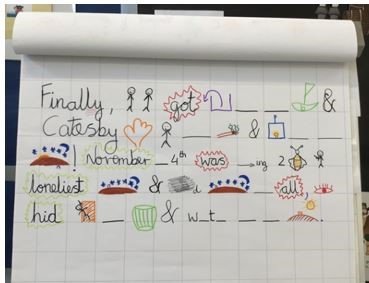 potential will also receive 1:1 and small group interventions which might include pre-teaching and over-learning. This means that they may be exposed to relevant vocabulary before the lesson so that they are familiar with certain words before their new learning begins. The classrooms are tailored to the topics that the children are working on with working walls that display vocabulary, topic information and writing examples that the children can use to support their learning. Teachers and teaching assistants give children verbal feedback throughout lessons so that they receive appropriate support at the time of need and can implement the feedback in their work straight away. Children can also use laptops and other aids to support their ability to write at pace.
potential will also receive 1:1 and small group interventions which might include pre-teaching and over-learning. This means that they may be exposed to relevant vocabulary before the lesson so that they are familiar with certain words before their new learning begins. The classrooms are tailored to the topics that the children are working on with working walls that display vocabulary, topic information and writing examples that the children can use to support their learning. Teachers and teaching assistants give children verbal feedback throughout lessons so that they receive appropriate support at the time of need and can implement the feedback in their work straight away. Children can also use laptops and other aids to support their ability to write at pace.
Writing in the Early Years
Language and Communication
At Clee Hill Community Academy, we believe that effective communication is key to successful learning across the curriculum. Children learn to listen and speak long before they learn to read and write. In the EYFS we provide a language rich environment that encourages positive relationship building.
Children have the opportunity to become involved in practical experiences promoted through play. Adults join in with this play both talking with, and listening to the children, taking into account their interests and previous experiences. The children are exposed to the correct grammatical structure of sentences through consistent modelling by adults and the children are encouraged to extend their vocabulary through forced alternatives. The frequent use of stories, songs and games provide the children with an opportunity to explore and build confidence in language.
Our Early Years Curriculum
As part of our EYFS curriculum, there are milestones which have been carefully constructed with an end goal, to reflect our own dynamics and environment to meet our children’s needs, whilst ensuring a stimulating, challenging and diverse curriculum. Although many aspects of the Early Years Curriculum develop a solid understanding for Writing in Year 1, 'A Wow Writer' is of particular importance to show the progression of learning through Nursery and Reception.
EYFS Curriculum milestones and goals
Writing in the EYFS
Each classroom has a well organised writing area that includes a variety of different resources for mark making and writing such as large sheets of paper, coloured paper, notebooks, diaries, postcards, clipboards, whiteboards, pens, pencils, high-frequency word cards, alphabet cards, interactive displays, messages and examples of children’s writing. These resources should all be available for the children to use independently.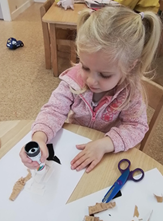
• Puppets, props and small world should be available for role-play.
• The outside area also provides opportunities for reading, writing and role-play.
• Activities to develop children’s fine and gross motor skills are provided e.g. building wrist strength by twirling ribbon sticks, practising writing patterns with big brushes and water, making letters in the sand.
• The interactive whiteboard is accessible to the children.
• Inviting book corners have a good variety well organised quality books - hard cover, soft cover, fiction, non-fiction and rhymes.
• Books in all areas of learning
• Displays celebrate children’s achievements and support children’s future learning, being interactive where appropriate. They also include typed and handwritten text and captions from adults and children.
Celebrating writing
Celebrating writing is so important to children across the school. It’s a chance for children to see what ‘good writing’ looks like and to celebrate the work
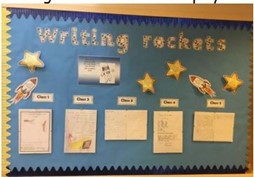 they have completed. Every week, ‘good writing’ is chosen to be displayed on our ‘Writing Rockets’ board.
they have completed. Every week, ‘good writing’ is chosen to be displayed on our ‘Writing Rockets’ board.
Spelling
At Clee Hill Academy, we have enhanced our teaching of spelling in Year 2 upwards, by introducing 'The Spelling Book' By Jane Considine. The Spelling Book is not a scheme, it’s more a way of teaching spelling that relies on
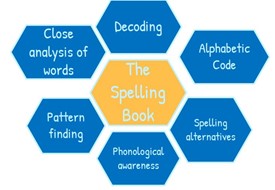 teachers to bring the ‘wonder of words’ to life. The Spelling Books provide structure and support to teachers whilst allowing enough room for
teachers to bring the ‘wonder of words’ to life. The Spelling Books provide structure and support to teachers whilst allowing enough room for
creativity, ensuring that all National Curriculum fundamentals are covered. The Spelling Book system exceeds all expectations around making the teaching of spelling effective, and ‘stick-able', for children.
All of the concepts, activities and tasks within the books have been designed to increase ‘stickability’ and retention of vocabulary. The system is built on strong phonic foundations and includes a range of deep exploratory investigations, alongside short-burst ‘chunked’ revision activities.
Grammar and Punctuation
• The Pie Corbett teaching progression shows coverage in each year group
The National Curriculum (DfE, 2013) gives a clear developmental programme for the introduction and acquisition of knowledge about grammar and punctuation. During lesson warm-ups and writing sessions children are explicitly taught the areas of grammar appropriate for their particular age. Children are encouraged to use the appropriate terminology
during lessons e.g. adjectival phrase, subordinate clause etc.
Impact
The impact on our children is that they have the knowledge and skills to be able to write successfully for a purpose and audience. With the implementation of the writing sequence being established and taught in both key stages, children are becoming more confident writers and have the ability to plan, draft and edit their own work. By the end of key stage 2, children have developed a writer’s craft, they enjoy sustained writing and can manipulate language, grammar and punctuation to create effect. As all aspects of English are an integral part of the curriculum, cross curricular writing standards have also improved and skills taught in the English lesson are transferred into other subjects; this shows consolidation of skills and a deeper understanding of how and when to use specific language, grammar and punctuation.
